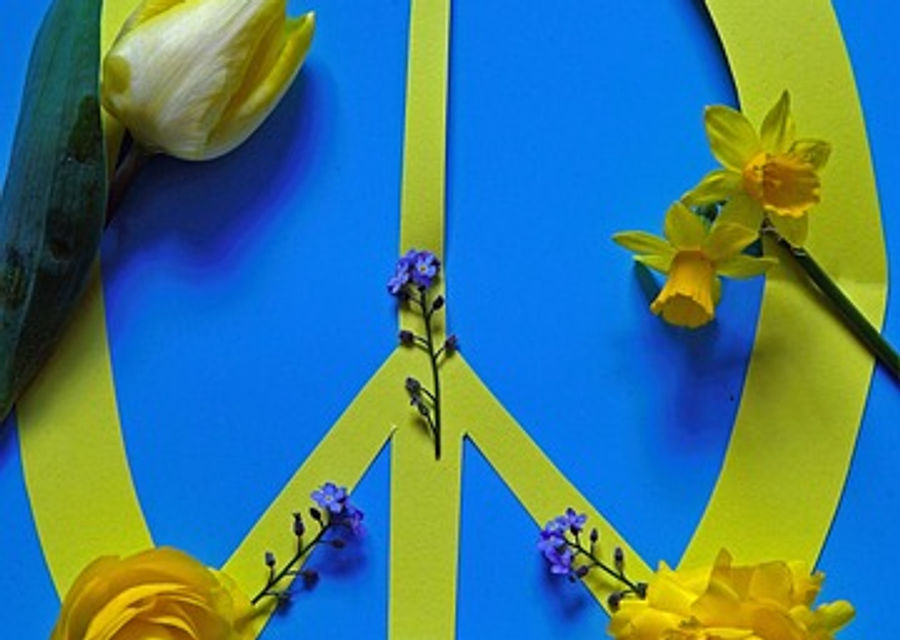Ukraine Peace Negotiations: Ensuring Kyiv's Voice in Diplomacy
- THE MAG POST

- Aug 10
- 6 min read

The ongoing Ukraine conflict highlights the nation's critical role in international peace negotiations. European allies insist that any discussions with Russia must include Kyiv, reinforcing Ukraine's sovereignty in future agreements. Concerns have been raised about the lack of direct Ukrainian involvement in talks aimed at resolving the crisis. President Zelensky’s statements emphasize that decisions made without Ukraine equate to undermining its future, showcasing the vital need for its inclusion in peace discussions.
The ongoing conflict in Ukraine has brought forth a complex debate around diplomatic negotiations. Ukraine's European allies, emphasizing their unified stance, are adamant that any peace discussions involving Russia must include the voice of Kyiv. This is crucial given the historical context and the sacrifices made by the Ukrainian people since the onset of the conflict. The commitment from leaders including those from the UK, France, and Germany reinforces that Ukraine remains central in shaping its own future, especially as these discussions loom at the upcoming U.S.-Russia summit.
Vital Role of Ukraine in Peace Negotiations
Ukraine’s position is pivotal in international talks as evidenced by a recent joint statement from its European allies. They categorically asserted that any peace agreement must include Ukraine, stating, "The path to peace in Ukraine cannot be decided without Ukraine." This declaration underscores that the sovereignty and territorial integrity of Ukraine are not negotiable topics. It highlights the international community's understanding that lasting solutions necessitate Ukrainian involvement to avoid superficial agreements that fail to address the root causes of the conflict.
Privacy concerns arise as the stakes become higher with the upcoming talks. President Volodymyr Zelensky expressed his worries about potential agreements made without Ukraine's participation, dubbing them "dead decisions." His statement reflects a deep-rooted sentiment within Ukraine, where citizens are not just looking for an end to fighting, but a just resolution that respects their independence and territorial claims.
The backdrop for these talks is set against the uncertain landscape of Russian aggression in Eastern Ukraine, where any discussion on territory raises significant concerns for Ukrainians. Zelensky has declared, "Any agreements against us, any decisions without Ukraine, are also decisions against peace," emphasizing the need for Ukraine to be actively involved in any negotiations that affect its nation.
While diplomacy is crucial, it is equally essential to maintain respect for international borders. Recent reports indicate that the Kremlin, under President Putin, has made audacious claims about territorial exchanges that are deemed unacceptable by both Kyiv and its allies. The stance taken by European nations, which states that changing borders through force will not be tolerated, shows solidarity with Ukraine amidst these precarious discussions.
Therefore, the crux of the upcoming U.S.-Russia summit revolves around integrity and ensuring that Ukraine is more than a spectator in discussions that directly impact its future. European leaders have voiced their concerns about a lack of influence over any agreements expected from this meeting. Highlighting that true resolution demands inclusive dialogue, leaders across Europe reiterate their unwavering support for Ukraine.
International Support for Ukraine's Sovereignty
The future of Ukraine is intricately tied to international support and recognition of its sovereignty. Amidst the geopolitical complexities, the shared sentiment among European nations is a commitment to uphold Ukraine's rightful claim to its territory. This unwavering support provides the necessary political backing that Kyiv needs as it navigates the treacherous waters of diplomacy where external powers seek to impose conditions.
As the world watches closely, the tension surrounding the upcoming summit poses a significant concern. U.S. President Donald Trump’s willingness to meet with Putin has raised eyebrows about the potential ramifications for Ukraine. The fear is not just about what might be discussed behind closed doors but also how these negotiations could affect the balance of power in Europe and Ukraine’s security.
Zelensky's firm stance on not rewarding aggressors echoes a broader sentiment in the nation. The narrative that any trading or bargaining of Ukrainian territory is out of the question reinforces a protective strategy surrounding national identity and autonomy. Tools such as sanctions against Russia alongside support for Ukraine are pivotal in maintaining leverage in these negotiations.
This ongoing conflict continues to shape the political landscape of Ukraine, where future negotiations are seen not merely as diplomatic exercises but as crucial turning points for national survival. The involvement of European leaders and their commitment to Ukraine reflects a multifaceted approach that combines military support with diplomatic efforts.
Ultimately, achieving a sustainable resolution to the Ukraine conflict hinges on maintaining a unified front and ensuring that Ukraine's voice is not lost among the international dialogues. The European allies’ insistence on Ukraine’s involvement denotes a broader recognition that true diplomatic solutions rest upon collaboration with those directly impacted by the conflict.
Implications of the U.S.-Russia Summit for Ukraine
The potential implications of the U.S.-Russia summit for Ukraine stir a mix of hope and trepidation. As both Trump and Putin prepare for the meeting, discussions surrounding ceasefire proposals and territory exchanges remain critical. Historical interactions hint at previous attempts to broker peace that failed miserably; thus, the skepticism around the summit is palpable.
Concerns about Trump's past negotiations draw attention to the risks of sidelining Ukraine's needs. Negotiations that manipulate conditions or advocate for territory swaps run the risk of emboldening aggressors rather than ensuring peace. With Ukraine's troops still facing immense challenges, the urgency for clear and decisive outcomes at the summit is vital.
The statement issued by the European leaders calling for Ukraine’s autonomy and recognition in these talks reinforces the need for a strong position. Arguments on both fronts highlight the significance of involving Ukraine not just as a participant but as a leading voice in crafting its destiny amidst a geopolitical crisis.
Zelensky's messages to allies reinforce the notion that engaging Russia without including Ukraine diminishes the potential for lasting peace. He proactively seeks assurances that any agreements will prioritize Ukrainian interests while also addressing the broader security landscape of Europe.
Thus, as the summit approaches, the world watches to see whether it will foster a meaningful opportunity for resolution or merely serve to perpetuate the ongoing strife. The outcome will undoubtedly shape not just in the current landscape for Ukraine but the stability of the entire region moving forward.
Future Prospects for a Just Peace in Ukraine
Looking ahead, achieving a just peace in Ukraine requires multifaceted strategies that extend beyond surface-level diplomacy. It emphasizes that the international community's role is not limited to mere facilitation but involves active participation in ensuring that Ukrainian sovereignty is respected. This commitment involves consistent diplomatic engagement and support at various levels, ensuring Ukraine is robust enough to resist external pressures.
Additionally, military assistance coupled with humanitarian efforts plays a pivotal role in enhancing Ukraine’s resilience. Striking a balance between military strategy and diplomatic efforts is paramount to securing a peace that respects territorial integrity. This balance is crucial, particularly in enhancing defenses while fostering dialogue with other nations.
Evolving dynamics in the region may present new opportunities for collaboration that could redefine relationships for long-term harmony. A peace framework that centers around mutual respect and inclusion can pave pathways for sustainable progress.
The concerted voices from Ukraine’s allies advocating for rigorous adherence to humanitarian principles and international law provide a foundation for meaningful negotiations. By involving Ukraine as not just a participant but a leader in dialogues, the prospects for peace transform from mere possibilities into achievable realities.
Ultimately, the resolve to uphold Ukraine’s sovereignty and integrity transcends individual nations, representing a collective commitment of the global community to foster not only peace but also a flourishing democratic future for Ukraine.
From our network :






















































Comments